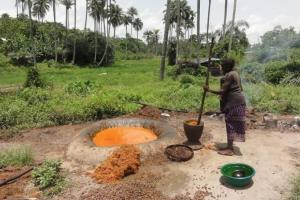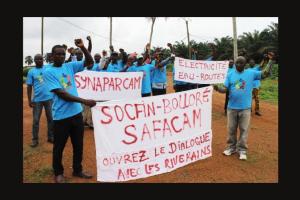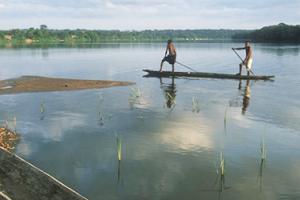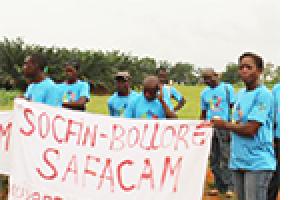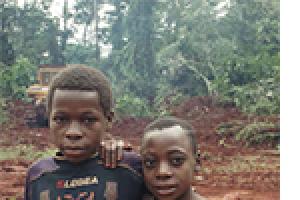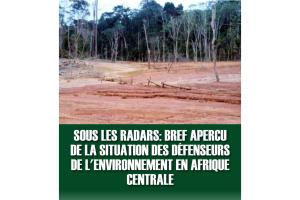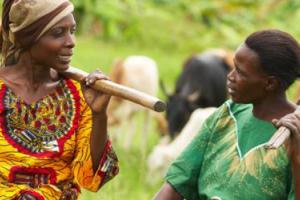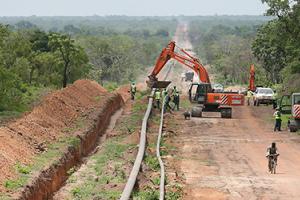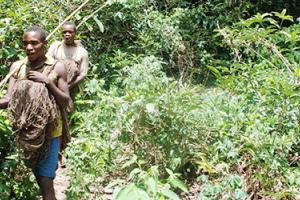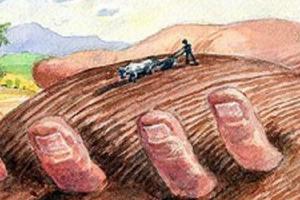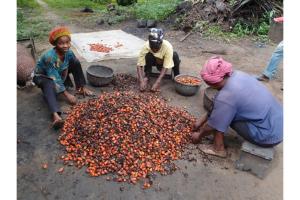Marie Crescence Ngobo coordinates the Sustainable Development Actors Network in Cameroon (RADD, by its French acronym). RADD works with women on economic and social issues, organizing activities that help women regain their identity and autonomy, in order to improve their families' living conditions.
Marie Crescence, you organized four workshops on traditional oil palm in 2016. How did that work, and what did you observe in those meetings with women?
Cameroon
Other information
8 December 2016
The short video shows how the large-scale oil palm plantation project has negatively impacted the lives of thousands of community members, threatened biodiversity hotspots, and failed to meet development promises to local communities in the Southwest region of Cameroon. The film was released in anticipation of a crucial decision to be made by the Government of Cameroon on the renewal of a land lease for the controversial Herakles Farms (SGSOC) project. “The Wrong Project in the Wrong Place” is available here:
Other information
8 December 2016
Bulletin articles
13 July 2016
The Congo Basin in Central Africa contains the second largest forest in the world. Its extensive territory is shared by six countries: the Democratic Republic of Congo, the Republic of Congo, Gabon, Cameroon, the Central African Republic, and Equatorial Guinea. With this Bulletin we seek to explore in depth and report on the intense land-grabbing that people are confronted with and resist in this region—a forested area that houses and provides the livelihood and sustenance for around 30 million people.
Bulletin articles
13 July 2016
Socapalm and Safacam are two companies controlled by Socfin, a multinational agribusiness specialized in the cultivation of oil palm and rubber. The group has financial and operating companies in Belgium, Luxembourg and Switzerland, which manage plantations in a dozen African and Asian companies. The group's aggressive expansion policy has led to land-grabbing, causing serious impacts on local communities' living conditions.
Bulletin articles
13 July 2016
In southeast Cameroon, Baka Indigenous Peoples and their neighbours continue to be illegally evicted in the name of conservation, most recently for a game reserve set up in 2015 with the support of the World Wildlife Fund (WWF). A video made by Survival International shows the testimonies of Baka men and women revealing the violence they have suffered at the hands of anti-poaching militias backed by WWF. This debunks WWF’s claims that the situation seems to have improved.
Other information
13 July 2016
This report aims to draw attention to violations and threats that environmental justice defenders in Central Africa are facing, specifically in the Congo Basin. The report is based on two studies. The first concerns the legal framework for the protection of environmental justice advocates in Central Africa. The second focuses on the inclusion of communities' rights in Central African countries.
Read the report in French.
Bulletin articles
13 July 2016
The agricultural force on the continent
In Cameroon as in many African countries, women daily endure practices that could be considered discriminatory in various areas of society, and especially related to land ownership. “In our family, a woman is a good, like a house or a plantation,” said Léon Mba, leader of the Pamue Congress in 1949. (1)
Bulletin articles
13 July 2016
(*)
Bulletin articles
13 July 2016
Other information
13 July 2016
A video produced by GRAIN shows how rural women in West Africa are working to protect traditional palm oil production in the face of the destructive expansion of industrial oil palm plantations.
Watch the video here.
